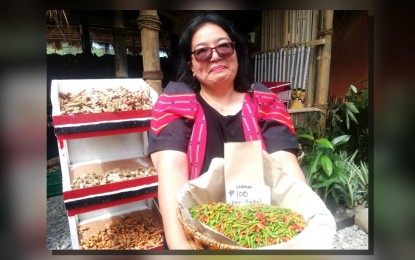
SAFE FOOD. Lawyer Jennilyn Dawayan, regional director of the Department of Agriculture in the Cordillera, carries a basket of organically produced native chili from Benguet during her rounds on Tuesday (Nov. 14, 2023) at the agri-tourism fair called Adivay Festival, which is now on its 18th year, at the Wangal Sports Complex in the capital town La Trinidad. Dawayan said vegetables produced in Benguet are very safe for human consumption since many farmers are adopting Good Agricultural Practices and organic way of production. (PNA photo by Liza T. Agoot)
LA TRINIDAD, Benguet – A Department of Agriculture-Cordillera Administrative Region (DA-CAR) official on Tuesday cited the increasing number of Benguet farmers who continue to comply with the Good Agricultural Practices (GAP) and those that are into organic farming.
In an interview at the sidelines of the opening for the 18th annual agri-tourism Adivay festival here, lawyer Jennilyn Dawayan, DA-CAR regional director, said local farmers continue to follow good practices not only to improve production but to ensure safety of the consumers.
She said there are 344 farms in the province that are GAP-compliant as of Nov. 2 this year, up from just 50 in 2019.
“From 2016 to now, much has been done to inculcate among farmers the relevance of GAP, encouraging them to adopt it and apply for certification, which is free,” said Dawayan, a native of Buguias town in Benguet.
Buguias is among the top producers of vegetables included in dish called “chopsuey”, a stir-fried mixed veggies that include broccoli, cauliflower, bell pepper, baby sweet corn, carrots, snow peas, chayote and mushroom.
“Our vegetables are very safe for human consumption,” Dawayan said.
Cordillera produces 85 percent of the country’s semi-temperate vegetable requirement, with Benguet, a highly agricultural province, producing about 70 percent of the region’s total production.
Dawayan said the number of GAP-certified farmers in the region is small relative to the other regions, although Benguet has the higher number within CAR.
She said they also aim to have more stakeholders who will go into organic farming as well as those who produce crops that are eaten raw, adding the DA has a laboratory that checks on the pesticide content of vegetables in the market.
“But we do not do it in a punitive manner but we try to look for those farmers who might have exceeded or whose products show an excess (pesticide use level) if there are. So far, we are monitoring a good compliance,” she said.
Dawayan said aside from GAP, some farmers are shifting to organic production and the newcomers in vegetable production adopting the organic way of producing vegetables.
“(The municipality of) Tublay in Benguet is the first Participatory Guarantee Systems (PGS) certification holder in the country,” she said.
PGS is locally focused quality assurance systems that certify producers based on active participation of stakeholders and are built on a foundation of trust, social networks and knowledge exchange.
Dawayan said several agri-tourism sites in the region have been opened, and have supported the thrust of the DA on food sustainability as well as the tourism department’s opening of more tourist destinations.
“They contribute to food safety starting from the GAP practiced by many Benguet farmers towards the direction of organic production,” she said.
Dawayan said demand for organically-produced food is high.
“We already have a lot (of farmers) who produce organic products but marketplaces for these items still run out of supplies, which shows the demand. That should be an avenue farmers must look into --the potential market of organic food products,” Dawayan added. (PNA)
